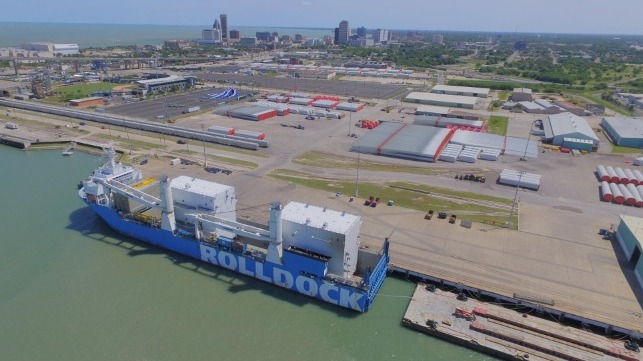Port of Corpus Christi's Investments Enable Every Type of Energy Cargo

The Port of Corpus Christi is known for its petroleum business, especially its booming oil export trade, but it also has a thriving breakbulk and project cargo segment. Its five multi-purpose docks handle steel pipe for upstream and midstream companies, giant process modules for the petrochemical industry and wind turbine components for the growing onshore wind sector.
"We see ourselves as the energy port of the Americas, and that means that we're big fans of energy all around," says Eddie Martinez, trade development manager for the port. "That means renewables as well as crude oil and petrochemicals."
The port has attracted breakbulk clients thanks to great rail connectivity, its short pilotage distance to the sea, and its flexible storage and laydown capacity. It also continues to invest in new facilities for its breakbulk clients: the port recently opened 40 acres of stabilized ground for heavy cargo laydown at the Rincon Industrial Park, located on the north side of the Corpus Christi Ship Channel. Alongside the storage area, the port has installed a rail track capable of handling a full unit train. Over the course of the two-phase development, Port of Corpus Christi invested about $14 million in site improvements.
"As soon as we built it, we were able to lease it out to several customers, including a wind company that used it to stage components and then load them directly onto rail cars for delivery to project sites," says Martinez. "We have another 22 acres of undeveloped property available whenever a client has a need for more space."
Corpus Christi has a short 36-mile channel from its general cargo docks to open water, and now that its long-awaited harbor dredging project is under way, that channel is set to become much deeper and wider. When work is completed, it will be 54 feet deep by 530 feet wide, with an additional 400 feet of barge shelves on either side - giving ample room for future traffic levels.
Hinterland connectivity is important to all shippers, and the port's breakbulk terminals offer rail service via three Class 1 rail lines - Union Pacific, BNSF and Kansas City Southern. This gives cargo owners a competitive choice when it comes to moving heavy breakbulk cargoes inland. Direct access to the Intracoastal Waterway System also makes it easy to arrange for waterborne transportation along the Gulf Coast.
The port's well-developed breakbulk infrastructure is valued by wind turbine OEMs, pipeline companies and refinery operators, and it is also ideal for the U.S. military. The Port of Corpus Christi is a designated strategic port, and it handles some of the largest military equipment shipments in the United States.
"When we handle a military deployment or redeployment, we take that very seriously. The port steps up to meet all of their requirements. We can arrange for conference rooms if they need them on site, covered storage for helicopters or vehicles, whatever they need," says Martinez. "Our deployments have been very successful and we continue to help our military neighbors."
Leading shippers of all kinds know that the Port of Corpus Christi is ideal for breakbulk cargo. For more information, visit portofcc.com.
This post is sponsored by the Port of Corpus Christi.
The opinions expressed herein are the author's and not necessarily those of The Maritime Executive.
